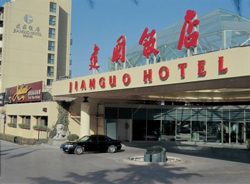China Remembered: The Jianguo Hotel Gets a Fax Machine
 Aug. 7 – China at the end of the 1980s was a very different place than it is now. The platform of contemporary China in terms of infrastructure was already being put in place and China’s rise was perfectly timed in terms of its taking place during the communications revolution – email and internet had not yet been put into place anywhere globally just twenty years ago. Two decades ago, none of that infrastructure existed at all, and the rise of such communications architecture has undoubtedly been a huge, yet largely unrecognized factor in China’s meteoric development.
Aug. 7 – China at the end of the 1980s was a very different place than it is now. The platform of contemporary China in terms of infrastructure was already being put in place and China’s rise was perfectly timed in terms of its taking place during the communications revolution – email and internet had not yet been put into place anywhere globally just twenty years ago. Two decades ago, none of that infrastructure existed at all, and the rise of such communications architecture has undoubtedly been a huge, yet largely unrecognized factor in China’s meteoric development.
Business in the China of the 1980s was still conducted in the old-fashioned way, using technology that hadn’t really changed much since the end of WWII. Telephone lines were in scarce supply, most buildings and certainly residential blocks had no telephones. Even the major hotels had limited numbers of lines, and calls during peak time had to be pre-booked with the hotel telephone operator. You’d place your call through the switchboard, and she would dial the number you requested. When (and if) it was answered, she’d connect you.
This meant, although it was normal at the time, that contracts and agreements would proceed to conclusion at a far slower pace than would be considered acceptable today. Accordingly, only a foreign businesses most senior management team, those with authorized signatory status, and always in the company of their corporate lawyers, would travel to China to sign contracts.
Beijing in those days had several hotels, but only a handful were open for foreigners. The Great Wall Sheraton had opened (shortly to be copied in architectural design by the Chinese owned Kunlun Hotel across the road), the Grand Hotel near Tiananmen Square, the Hotel Nikko, catering for Japanese and Korean businessmen, and the Jianguo Hotel which engaged at the time a Swiss management company to help run it. Of them all, the Jianguo Hotel was the social meeting point for traveling businessmen.

Charlie’s Bar, which still exists, saw many a deal done over its tables, and one could spot the leading American and European tycoons and industrial leaders of the day having a beer there with an array of Chinese government officials and state-owned factory managers, fervently discussing plans for the new China. The bar would also be packed until very late – not because of the drinking (although that was a secondary reason) – but because everyone was waiting to use one of the limited phone lines to discuss deals in progress with their boards back in Europe and the United States. At 10 p.m. in Charlie’s Bar, it would be 2 p.m. in London and 9 a.m. in New York. The time difference with executives waiting to call home made the bar the busiest joint in town.
One of the problems with China business of the day was that the Chinese would always want to pin down agreements immediately, and would put pressure to do so. If a contract couldn’t be signed, they would question the status of the person involved. Due diligence became awkward, and certainly some deals of the day were rushed through rather quicker than they normally should have been. Consequently, it was a red letter day when the Jianguo Hotel announced it had been granted permission to have a fax machine, and that it would be made available to foreign businessmen. I guess in the day a specific data line had to come in to handle such transmissions, and that these were in very short supply. The hotel, busy anyway, suddenly boomed as it was the only hotel in Beijing to offer the service, and remained that way for about 18 months. The Jianguo was packed 24/7 with businessmen all wanting to send and receive faxes, mainly to their legal departments to check and sign off on contracts. The hotel even ran a series of adverts at the time promoting the fact that “a Sino-U.S. JV agreement was sealed in 24 hours,” all down to the fax machine.
Today, the Jiangguo Hotel is rather more sedate and is used mainly by tourists. Businessmen can email contracts around the globe in a split second, and the fax machine itself has become nearly obsolete. It’ll be a long time in our daily business lives before we experience an occasion as exciting or even revolutionary as the Jianguo Hotel getting a fax machine.
Chris Devonshire-Ellis is the founding partner of Dezan Shira & Associates and lived in China for 21 years. He is now based in Mumbai. This is one of a series of “China Remembered” articles we will run in China Briefing during August. They will appear every Friday .
.
Chris’s popular book, “The Story Of A China Practice,” detailing the establishment of both Dezan Shira & Associates and China Briefing from 17 years ago to the present is also available as a free download to all China Briefing subscribers. It can be accessed by clicking on the picture to the right.
- Previous Article Shanghai Petitions Currency Rule Changes to Attract More Foreign Private Equity Firms
- Next Article Shanghai Expo 2010: The French Pavilion









